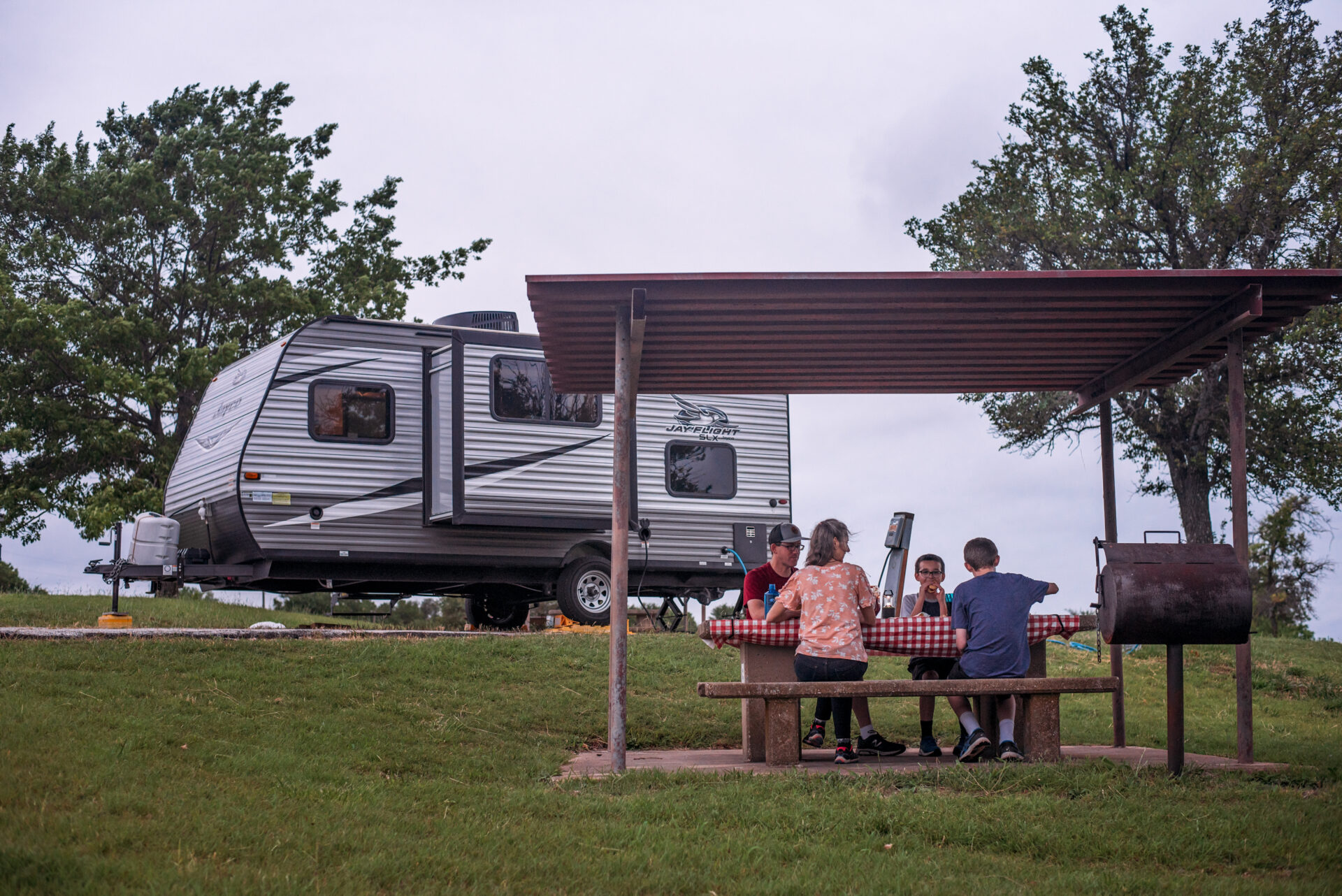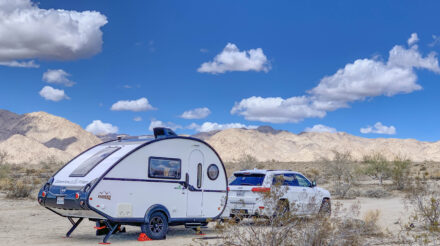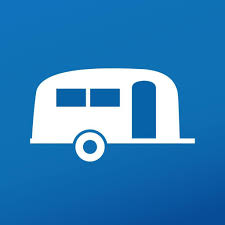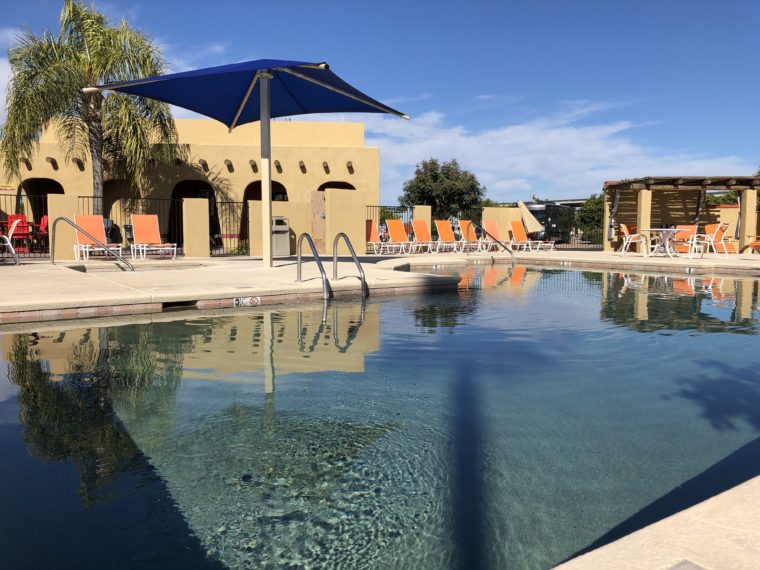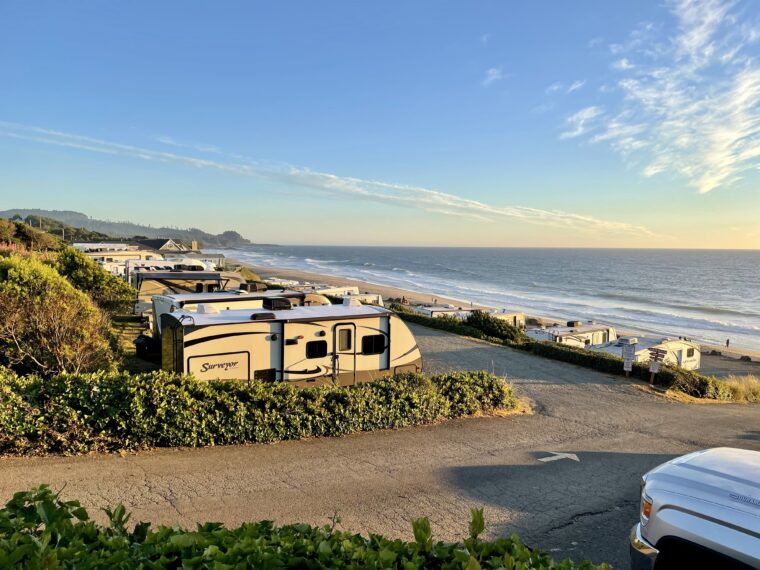Camping is more popular than ever, and with so many new campers come a need to share the written and unwritten rules of campground etiquette. People camp for a variety of reasons, so it’s important we all respect one another in the outdoors.
Here are some tips for how to be a good campground neighbor.
1. Be Clean
Campground Cleanliness
It’s inevitable that you’ll produce some amount of trash when camping. Throw out food wrappers and other loose items immediately to avoid the wind blowing them away from your campsite. Parks hosts and representatives aid in campground cleanup, but don’t leave it to them to do it all. If you arrive at your site and you find leftover trash, pick it up. As a responsible RVer, pitch in by disposing of any trash you encounter around the campground.

Another reason to keep trash out of your site is to keep animals away. You don’t want a team of raccoons raiding your cooler that was left outside at night. Most unwanted wildlife encounters at campgrounds are easily preventable by keeping campground etiquette rules in mind. Simply put, food attracts wildlife. So, clean up when you’re finished eating and preparing meals.
Some campgrounds have strict rules in place for food and trash storage to keep animals away. It’s dangerous to have large predators roaming through campsites because they’re attracted to food at the campground.
10 Things We Wish New RVers Knew at the Campground
One common misconception within national and state parks is that it is acceptable to leave fruit peels and nut shells on the ground. While biodegradable, these items can take a long time to decompose. They also introduce non-native seeds and plants that can negatively impact the ecosystem. Plus, you don’t want to attract rodents and insects around the campsite.
Check with the park office or host about trash pickup since every campground has a different policy and trash schedule. Some locations have a “pack in, pack out” policy where visitors must take full responsibility for all waste.
It might be tempting to put your charcoal grill on the park’s picnic table, but this isn’t recommended. Grilling on the table can leave burn and scorch marks, which can cause damage over time. Bring a portable folding table to use for these tasks instead.
This seems like a no-brainer, but don’t place your sewer hose on the picnic table where others eat. It’s always a good idea to cover the table with a tablecloth, but don’t assume that everyone else will.
In addition to regular trash, pick up any pet waste, and don’t forget to properly dispose of it in a trash bin or dumpster.
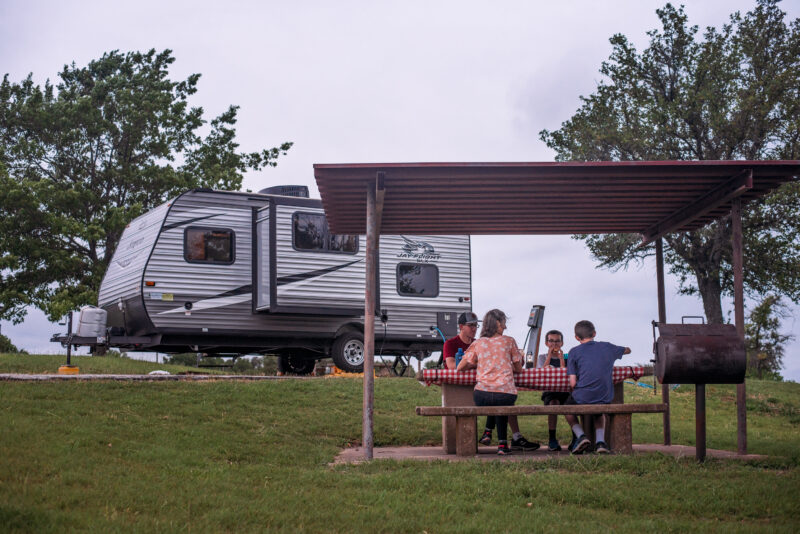
Campground Facilities
Many developed campgrounds come with amenities such as restrooms, showers, and laundry facilities. Some campers prefer to use a park’s shower rather than the one in their RV.
While these facilities are maintained by park staff or volunteers, it’s important to treat them with care so that everyone can enjoy them. When using shared bathrooms, treat them as you would the one in your RV. Don’t leave dropped toilet paper on the ground and turn off any sinks to conserve water.
If there are people waiting to use the showers, be courteous and don’t linger for too long. Also, be sure to clean up and remove anything you brought into the shower stall so it’s ready for the next person.
RV Hookups
One of the most convenient aspects of RVing is having access to your own restroom. But this perk comes with responsibility, not only to the environment, but also to your fellow campers. Sewer hoses can leak if not properly placed. Make sure your hoses are secure and you don’t have a slow leak occurring at your site.
Inspect your hoses often for wear and tear so they don’t cause any odor or environmental issues around the site or at the dump station. If you have multiple hoses connected for a longer line, double check that they’re properly attached to avoid black tank issues.
2. Be Safe
Fire Safety
Fire safety is probably the most important campground etiquette rule to follow when camping. It’s the rule that helps to keep you, your fellow campers, and surrounding communities safe.
When you first arrive at a campground, ask the ranger or campground host if there’s a burn ban in your area. This is a vital step to keep everyone around you safe. You can also look for signs that display fire danger levels or mention burn bans as you enter the area.
Another sign that there might be a ban where you’re staying is if there’s an ongoing regional drought or dry weather with high winds. Starting a fire in this type of environment can be extremely hazardous. It’s good practice to check online or call and ask if there is a burn ban at your destination before even hitting the road.
When making a campfire, be sure to monitor it. It only takes a small spark to create a forest fire. Also, be sure to use designated campfire rings or pits provided at most campsites.
Wildfire Safety Information and Forest Closures in North America
If the campground allows you to use a charcoal grill, monitor that as well. And before you go to bed, put enough water or sand on your campfire to put it completely out so that no embers can blow into the surrounding area.
National parks, national forests, state parks, local parks, and private campgrounds all have different firewood collection rules. Some places don’t allow you to collect downed trees while others do. Some even have firewood collection seasons.
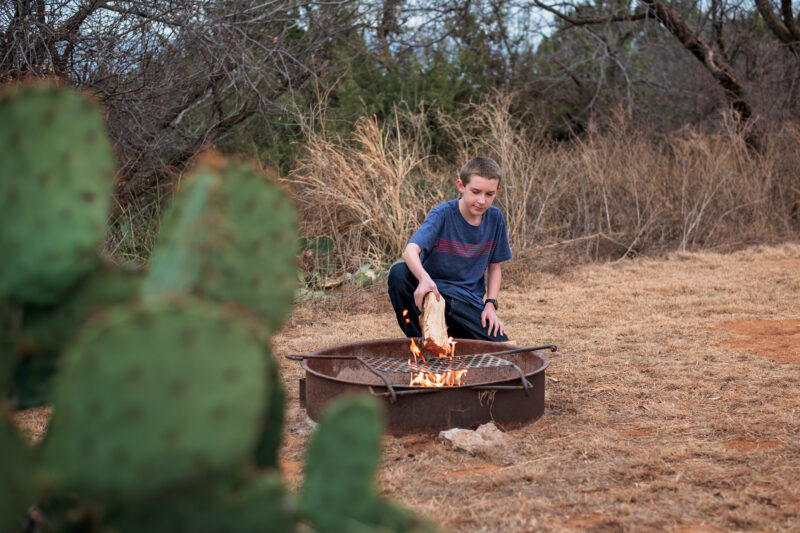
Most parks and campgrounds require you to use only heat treated wood that’s locally sourced. This prevents the spread of invasive species through the firewood brought into the park. Non-native insects, fungal spores, certain beetles, and even some moths can wreak havoc on an ecosystem when introduced to the area. Check with the ranger or campground host to make sure that you’re following the rules.
Don’t throw bottles and cans into the campfire—instead dispose of them in the campground recycling bin or dumpster.
Most campers don’t like to see a fire pit full of trash when they pull up to a campsite, so be respectful of fellow campers by throwing trash in the appropriate bins. Plus, you’ll also avoid paying a fine since many campgrounds now charge for trash left in a fire ring.
How to Take a Safe and Responsible RV Trip During Wildfire Season
Pet Safety
Most campgrounds have etiquette rules when it comes to pets, like requiring them to stay on a leash while at the campsite and limitations on how long the leash needs to be—typically a maximum of 6 feet.
It’s never a good idea to let your dog roam freely around the campground. Even though your loveable canine companion might be the friendliest in the world, some people have dog phobias or skittish dogs. Not only can unleashed dogs potentially cause problems for neighboring campers, they can spook local wildlife and put themselves or your family at risk.
The Ultimate Guide to Boondocking With Pets
Driving
Just like on standard roads, campgrounds have posted speed limits. It’s important to abide by these rules to prevent an accident from happening. Drive slowly and remain alert when around the campground since kids are often riding bikes and scooters or playing tag around the property. With so many parked vehicles, they can pop out from numerous blind spots.
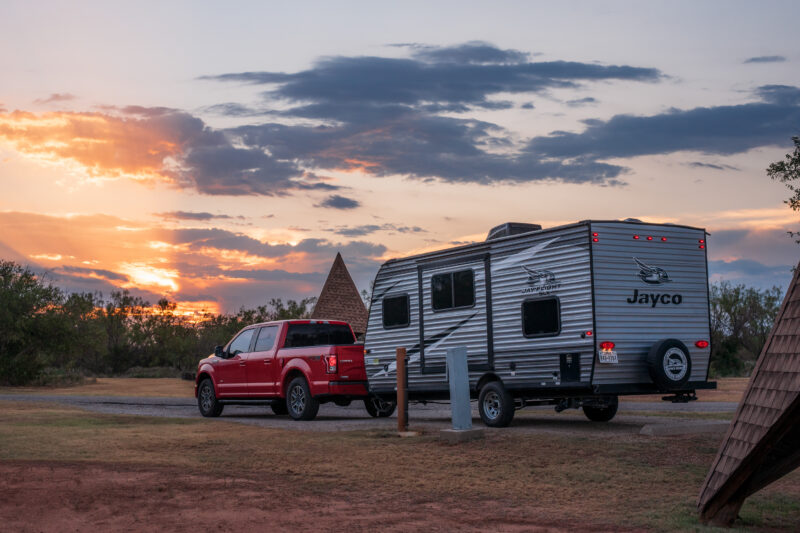
It’s also important to teach children to watch for moving vehicles; it’s easy to forget that a campground road is still a road. Set limits on where your kids can ride bikes or play, and review rules about what to do when moving vehicles are in the area near them.
3. Be Quiet
Campground Noise
Some RVers camp as a way to spend time with family and friends and enjoy large gatherings. Others camp because they’re trying to relax after a busy week at work or want to enjoy the peace and quiet of nature. Whatever your reason is, there’s one component of camping that’s in place at any given campground: quiet hours.
Quiet hours can vary depending on the rules set forth by the park, but they’re typically between the hours of 10 p.m. and 6 a.m. This doesn’t mean that you have to turn off the lights and go to bed at 10 p.m., but it does mean that it’s time to lower the volume on your music, TV, and voices. The walls in an RV aren’t equipped to block out all exterior noise, especially if your RV is parked close to your neighbor.
Be respectful of others around you—many RVers like to keep their windows open at night to enjoy a cool breeze and the quiet sounds of nature. Some neighbors, such as those camping in a pop-up, hybrid, or tent, will be directly impacted if you’re being too loud since they have no way to reduce outside noises.
Pet Noise
It’s good etiquette to keep your pet’s noise to a minimum at all hours of the day and night. Some dogs bark at people, other dogs, and unknown situations. Take the necessary measures to ensure they don’t become a nuisance.
If your dogs start to bark incessantly at someone or something, bring them inside. Some campgrounds might ask you to leave if you can’t get your dog to stop barking.
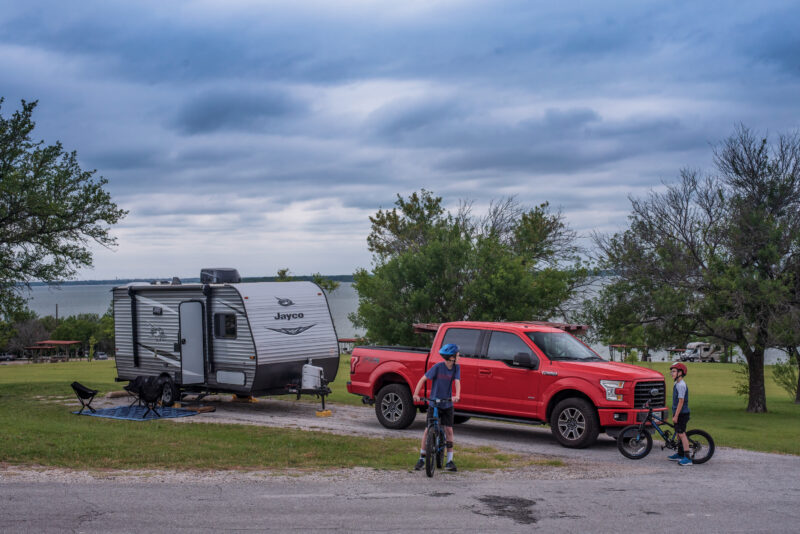
Children
Teach children to keep their voices low, especially if you’re camping close to a neighbor’s site. It’s important that kids are aware of other campers’ space and property. Children will make mistakes, so review the rules with them every so often.
Generators
If you’re boondocking, or camping with no hookups, chances are you’ll need a generator for power. Generator noise levels can vary between models, but no generator is quiet to a camper who is there for silence and solitude.
Many parks and campgrounds have rules about generator use, and some don’t allow them at all. Check local regulations before using a generator. It’s common to find campgrounds with designated hours where you can run the generator freely, but once those hours are over, it must be turned off. And, even if you’re camping somewhere without generator rules, you should still be aware of the times you’re running one. Most people enjoy their quiet time late in the evening.
12 Things We Wish First-Time Boondockers Knew
Late Arrival
Sometimes you have to arrive at a campground at night, when quiet hours are in effect. Do your best to minimize noise while pulling in and setting up camp. You can do this by keeping your voices down while backing into a site. It’s also a good idea to turn off your vehicle’s headlights once you don’t need them anymore, in order to avoid lighting up another camper’s site.
Only set up what you need to for the remainder of the night and wait until the next morning to finish setting up. Every park has its own rules when it comes to a late arrival, so be aware of any measures you need to take upon arrival.
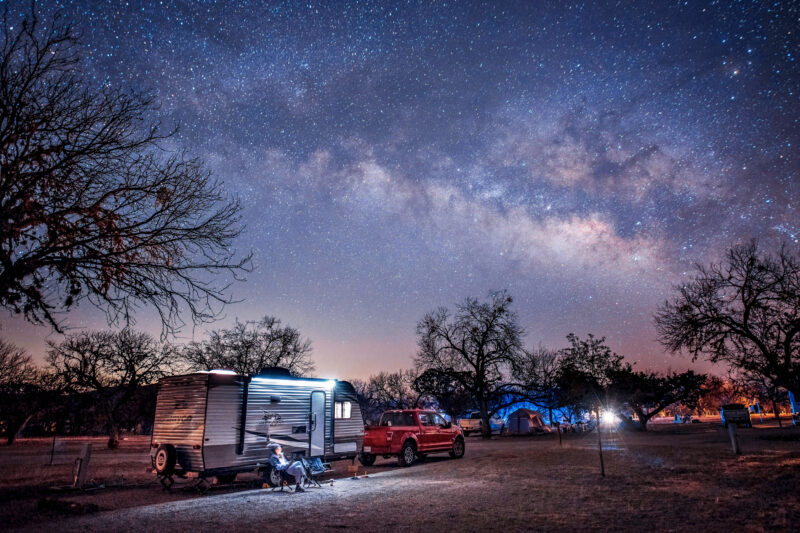
4. Be Socially Aware
Respect Boundaries
While an RV show or dealership is the perfect place to peek around a camper that doesn’t belong to you, the campground is not. It’s tempting to want to see other floor plans and models, but refrain from snooping on your neighbor’s rig unless invited.
When a campsite is reserved, this includes the space around it. Respect this concept and avoid cutting through another person’s site. Sometimes it may be unavoidable—for example, if the site is next to a trail or facility access point—but do your best to enter as far from someone else’s space as possible. Be courteous to your neighbors, and in return, you should receive the same treatment.
Space Evenly
Sometimes we choose campgrounds based on their excellent location or amenities. These are often RV resorts and campgrounds where sites are a little more packed together. Be sure you’re spaced evenly in your site, so your slide-outs only extend into your own space. This is especially important when someone next to you has a slide-out on the same side.
10 Mistakes Beginner RVers Should Avoid
Respect Reserved Sites
You should never take a campsite you haven’t reserved, unless it’s designated as a first-come, first-served site. Even if it’s past check-in and there’s an open site, don’t assume that the campers who reserved it aren’t arriving later in the night.
Be sure to double check your reserved site to ensure you aren’t accidently camping in the wrong site or a spot that you didn’t reserve.
Backing Into a Campsite
Parking your rig at a campground can feel embarrassing if you don’t make it on the first try. Most can relate to the frustrations that can come with backing into a site. It’s good campground etiquette to be patient and allow other campers to maneuver into their site without being critical or impatient.
Some campers like to help their new neighbors back into their site. Use social cues and read the situation to see if help is really needed or wanted.
Wait for Social Cues
If you’re a social person who enjoys getting to know your neighbors at the campground, don’t assume everyone else is there to make new friends. Let your fellow campers settle in to their campsite before going over to talk to them. Most people will use social cues to let you know whether they want to talk.
You can make some great friends while camping, but keep in mind that not everyone camping does it for the same reason. Sometimes it’s fun to enjoy some nice conversations with the RVers around you, but other times it’s wonderful to relax without talking to anyone.
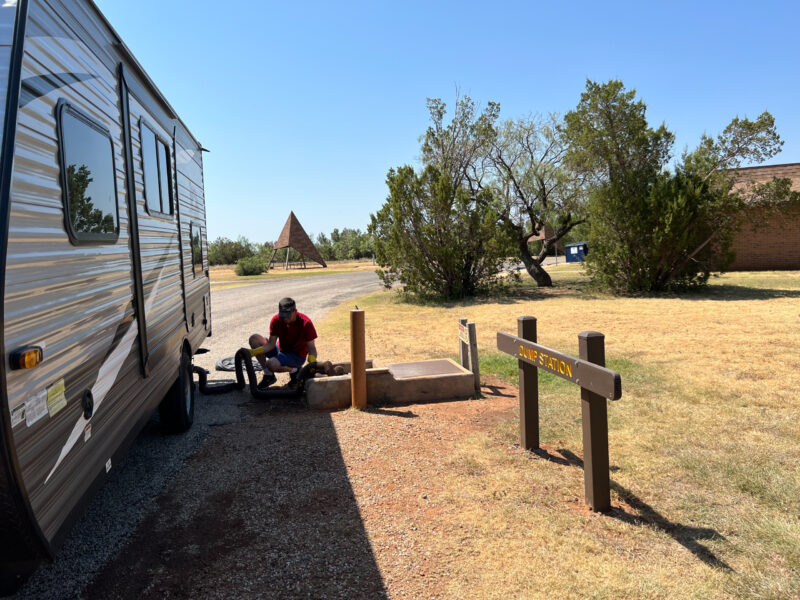
Dump Station
The time of year, the size of the campground, and the time of day will determine how long the line to the dump station will be. To speed up wait times, get ready ahead of time: Keep gloves and hand sanitizer ready, and unlock your compartments with necessary attachments.
Never dump your black or gray tanks onto the ground. If the park doesn’t provide a dump station, find another one nearby. Many gas stations have dump stations you can use for a small fee.
Everything You Need to Know About RV Toilets and Black Tanks
Campsite Lighting
When visiting a campground or part of the country known for its dark skies, remember to turn off your lights or, at the very least, minimize them when going to bed. Lots of bright exterior lights can detract from the experience of being in nature.
Some parks have rules about exterior lighting, so be sure to follow those. If you arrive after hours and are unsure what to do, take a look around at what other campers are doing. Also remember that you might be camping next to campers in tents or pop-ups with no way to shield themselves from bright lights.
Frequently Asked Campground Etiquette Questions
How do you keep a campground clean?
Follow these tips to help keep the campground clean:
- Throw out trash after cooking and eating.
- Pick up any trash you find at the campsite.
- Dispose of biodegradable trash such as peels and shells.
- Understand the campground’s trash pickup or pack out policy.
- Properly store food at night, especially in bear country.
- Keep charcoal grills and sewer hoses off of the picnic table.
- Pick up your pet’s waste.
- Pick up your dropped toilet paper and turn off the faucet in the campground restroom.
- Remove everything you brought to the campground shower.
- Make sure your sewer hoses are secure and not leaking.
What are some campground safety rules you should follow?
Here’s how to keep you and your family safe and protected when camping:
- Check if there’s a burn ban in the area before starting a fire.
- Always monitor your campfire and don’t leave it unattended.
- Make campfires in designated campfire rings and pits.
- Only use heat treated, locally sourced firewood.
- Throw trash, beverage bottles, cans in designated trash or recycling bins, not in fire rings.
- Keep your dog on a 6-foot leash and not roaming freely.
- Obey all posted campground speed limits.
- Teach kids to watch for moving vehicles.
What are the noise rules to follow when camping?
In order to be a camper with good campground etiquette around noise, follow these rules:
- Know and respect the park’s quiet hour rules.
- During quiet hours, bring the volume down on your television, radio, and voices.
- If your dog can’t stop barking, bring it inside the RV to calm down.
- Remind kids to keep their voices low early in the morning and near other campsites.
- Abide by generator quiet hours and other rules for the campground.
- When arriving late, make sure your volume is low when parking and setting up.
What are the social norms when camping?
Camping has a set of social norms you should follow. Here are some tips to help you:
- Don’t invite yourself into someone else’s RV.
- Avoid cutting through another camper’s campsite and respect their space by going around the perimeter.
- Make sure that you’re spaced evenly in your site if it’s a tightly spaced campground.
- Never take a reserved campsite you didn’t pay for, regardless of the time of day.
- When RVs are backing into their site, avoid squeezing by in another vehicle or being critical.
- Be patient with new arrivals and don’t be critical as they maneuver into a site.
- Read social cues to see if new neighbors want to talk.
- Prepare ahead of time for a busy dump station.
- Never dump your waste on the ground.
- Turn off or minimize exterior lights before going to bed.
Hopefully, you now feel more prepared to RV with others in mind while still enjoying the campground. Whether it’s campground cleanliness, safety, noise control, social awareness, or other etiquette-related rules, being more aware of how your adventure impacts others can help make a difference.
